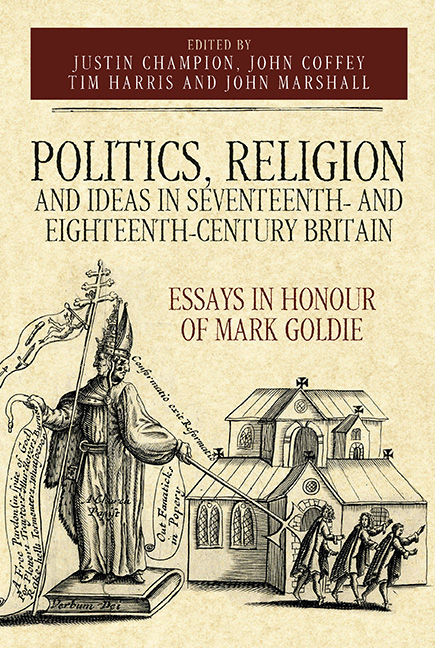 Politics, Religion and Ideas in Seventeenth- and Eighteenth-Century Britain
Politics, Religion and Ideas in Seventeenth- and Eighteenth-Century Britain Book contents
- Frontmatter
- Dedication
- Contents
- Notes on Contributors
- Acknowledgements
- Notes on Text
- Abbreviations
- Introduction: Mark Goldie – An Appreciation
- 1 Constitutional Royalism Reconsidered: Myth or Reality?
- 2 Teaching Political Thought in the Restoration Divinity Faculty: Avant-Garde Episcopacy, the Two Kingdoms and Christian Liberty
- 3 Violence, Protest and Resistance: Marvell and the Experience of Dissent after 1670
- 4 Bulstrode Whitelocke and the Limits of Puritan Politics in Restoration England
- 5 The Assassination of Archbishop Sharp: Religious Violence and Martyrdom in Restoration Scotland
- 6 Compassing Allegiance: Sir George Mackenzie and Restoration Scottish Royalism
- 7 Corruption and Regeneration in the Political Imagination of John Locke
- 8 Locke the Censor, Locke the Anti-Censor
- 9 London, Locke and 1690s Provisions for the Poor in Context: Beggars, Spinners and Slaves
- 10 The Reception of Locke's Politics: Locke in the République des Lettres
- 11 Court Culture and Godly Monarchy: Henry Purcell and Sir Charles Sedley's 1692 Birthday Ode for Mary II
- 12 Thanksgivings and the Signs of the Times: The Apocalypse in the Long Eighteenth Century
- 13 The ‘Secret Reformation‘ and the Origins of the Scottish Catholic Enlightenment
- 14 The Surprising Lineage of Useful Knowledge
- 15 The Vicissitudes of Innovation: Confessional Politics, the State and Philosophy in Early Modern England
- A Bibliography of the Writings of Mark Goldie
- Index
- Studies in Early Modern Cultural, Political and Social History
- Tabula Gratulatoria
15 - The Vicissitudes of Innovation: Confessional Politics, the State and Philosophy in Early Modern England
Published online by Cambridge University Press: 12 October 2019
- Frontmatter
- Dedication
- Contents
- Notes on Contributors
- Acknowledgements
- Notes on Text
- Abbreviations
- Introduction: Mark Goldie – An Appreciation
- 1 Constitutional Royalism Reconsidered: Myth or Reality?
- 2 Teaching Political Thought in the Restoration Divinity Faculty: Avant-Garde Episcopacy, the Two Kingdoms and Christian Liberty
- 3 Violence, Protest and Resistance: Marvell and the Experience of Dissent after 1670
- 4 Bulstrode Whitelocke and the Limits of Puritan Politics in Restoration England
- 5 The Assassination of Archbishop Sharp: Religious Violence and Martyrdom in Restoration Scotland
- 6 Compassing Allegiance: Sir George Mackenzie and Restoration Scottish Royalism
- 7 Corruption and Regeneration in the Political Imagination of John Locke
- 8 Locke the Censor, Locke the Anti-Censor
- 9 London, Locke and 1690s Provisions for the Poor in Context: Beggars, Spinners and Slaves
- 10 The Reception of Locke's Politics: Locke in the République des Lettres
- 11 Court Culture and Godly Monarchy: Henry Purcell and Sir Charles Sedley's 1692 Birthday Ode for Mary II
- 12 Thanksgivings and the Signs of the Times: The Apocalypse in the Long Eighteenth Century
- 13 The ‘Secret Reformation‘ and the Origins of the Scottish Catholic Enlightenment
- 14 The Surprising Lineage of Useful Knowledge
- 15 The Vicissitudes of Innovation: Confessional Politics, the State and Philosophy in Early Modern England
- A Bibliography of the Writings of Mark Goldie
- Index
- Studies in Early Modern Cultural, Political and Social History
- Tabula Gratulatoria
Summary
In a sustained programme of research, Mark Goldie has explored the interrelationships between politics, philosophy and religion in early modern England. His arguments have been insightful and often seminal in charting unexpected alliances, the centrality of intolerance in the Restoration period and the unintended consequences of sectarian commitments. I propose to cover similar terrain, with reference to a small sector of the polemical and conceptual vocabulary of English gathered around notions of innovation.
We take words in the ambit of innovation presumptively as intellectual virtues, not least in academia, where paradigm shifts, ruptures and revolutions are endemic to idioms of disciplinary self-promotion, and the isolation of points of innovation is vital to genealogical narration. Yet the vocabulary of innovation had diverging patterns of employment in early modern England. Predominantly condemned in confessional politics, innovation was increasingly lauded in natural philosophy and poetry. These domains of discourse were hardly self-contained, and so usage characteristic of one might have resonance for another. The mutually dependent friends William Cavendish, duke of Newcastle and Thomas Hobbes will be taken to illustrate something of the vicissitudes that I shall trace into the early nineteenth century.
First, however, brief comment on the early modern vocabulary of innovation may be helpful. The word new could, as now, simply signify an addition to a series; yet typically in political discourse, novelty suggestive of, or virtually synonymous with innovation, was regarded with hostility. This was conveyed though a clustering of cognate expressions: newness, new models, new Utopias, new schemes and plots, singularity and the new-fangled, specifically condemned in The Book of Common Prayer. Legitimate newness was apt to be located only in the distant, authoritative world of the New Testament. Benoît Godin has even claimed, albeit with some qualification, that from the Reformation to the nineteenth century, there was an ‘episteme of prohibition’ concerning innovation. Given the prejudicial nature of this concentration of vocabulary, more anodyne descriptors such as change and alteration might be risked to avoid contamination with innovation; but by a ‘domino effect’ they were easily collapsed into being mere euphemisms. Reformation or renovation might also be urged, but usually as antidotes to established innovations.
- Type
- Chapter
- Information
- Politics, Religion and Ideas in Seventeenth- and Eighteenth-Century BritainEssays in Honour of Mark Goldie, pp. 293 - 310Publisher: Boydell & BrewerPrint publication year: 2019
